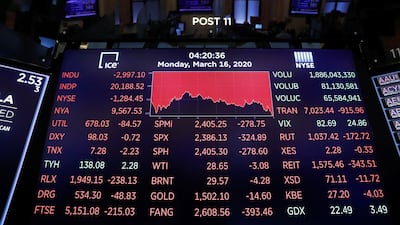The US is heading into a recession and the Federal Reserve's move to cut key interest rate is not the policy action the world's largest economy requires right now, top economic analysts at Allianz and Standard Chartered say.
"Yes, we are heading into a recession and it would be sharp," Allianz chief economic adviser, Mohamed El Erian told CNN. "It is very important that we contain the damage," he said.
The focus should be to make economic downturn "as short as possible" and deploy correct policy tools once the health issue become less paralysing, said Mr El Erian.
Sarah Hewin, Standard Chartered's chief economist for the Americas and Europe, echoed Mr Erian's assessment of a recession hitting the world's largest economy.
"We think it's going to be inevitable, when we see such a disruption to the economy, the halting of a lot of businesses, people hunkering down, consumers pulling back, inevitably this is going to cause a recession, the question is just how deep and how long. We think that the big hit will be seen very much in the second quarter," she told Bloomberg.
The Fed slashed its funds rate to 0 to 0.25 per cent on Sunday, less than two weeks after a 50 basis point emergency rate cut to 1 to 1.25 per cent earlier this month and ahead of a meeting later this week. The central bank also signalled it would begin a programme of asset purchases, including $500 billion (Dh1.84 trillion) of treasury bonds and $200bn of mortgage-backed securities.
But the measures failed to quell market anxiety or the sell-off across indexes globally. US data released on Monday was bleak confirming the descent in bearish territory after the longest bull run since the 2008 financial crisis.
"Financial markets are currently pricing in a global recession, despite concerted monetary policy, efforts to address liquidity and looming credit crunches. The ball is in the fiscal camp now," said Janwillem Acket, chief economist at Swiss bank Julius Baer.
The New York Empire State Manufacturing Index slumped to minus 21.5 after falling a record 34.3 points in March of 2020 from 12.9 in February. That's the lowest level since March of 2009 during the global financial crisis.
"Economic data are going to look pretty horrible for the next few months," Ms Hewin said. “You can’t avert a recession, all you can do is slow it down … and the question is what can the governments do?”
The biggest rate cut by the Fed since the 2008 crisis to avert a recession, however, is not helping the markets or the country's economy.
“The first rule of crisis management is don't fire all your ammunition when it is not going to hit the target,” Mr El Erian said. “The notion of cutting the interest rate by another 100 point, that is not going to change anything.”
The Fed, according to him, was in a "worse place" than it was before the policy move and has missed a trick, as it should have learnt from how the Bank of England is managing the crisis.
“I think the BoE [has] set an example, which unfortunately neither Fed nor ECB [European Central Bank] followed. It [BoE] had laser-focused measures including helping certain sectors [of the economy],” he said.
“We have to learn from the BoE because we cannot repeat policy mistakes. Otherwise we would create a whole new set of problems.”
The Fed decision, he said, showed a lack of "crisis management experience". In the market, the credibility of Fed is at stake and the US regulator is a "critical anchor" for the functioning of the markets.
After years of low interest rates and in some European countries negative interest rates, central banks around the globe are easing policy in the biggest co-ordinated response since the crisis more than a decade ago. However, investors are worried that central banks would spend all the ammunition at their disposal as governments in Europe and North America continue to lockdown their borders to stem the coronavirus outbreak.
"Central banks are pretty much close to the limits of what they can do," said Ms Hewin.
Despite the central banks’ actions, global equity markets tanked on Monday. The S&P 500 in the US tumbled 12 per cent, its biggest drop since "Black Monday" in 1987. Some $2.69tn in market value was wiped out from the S&P 500 as it suffered its third-largest daily percentage decline on record. Over the past 18 days, the benchmark index has lost $8.28tn.
The Dow Jones Industrial Index also slumped almost 13 per cent, while the Nasdaq Composite Index fell more than 12 per cent. The FTSE 100 Index in London slipped more than 4 per cent on Monday while the Euro Stoxx 50 fell 5.3 per cent.
Despite the economic uncertainty and the threat of a recession, banks in the US that were at the heart of the 2008 financial crisis, are in a “good place” and well protected, Mr El Erian noted.
“It is absolutely important that our banks are in a better place because that protects payments and settlements system. It’s like oil in the car, when it breaks down, nothing else works,” he said.
The companies, Mr El Erian said, will also have to protect their workforce as “this is not a permanent shock and they must not over-react”.


